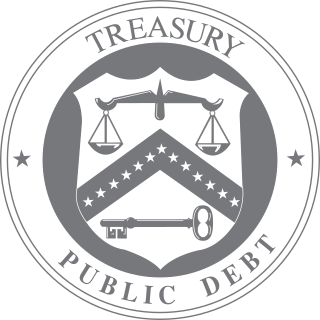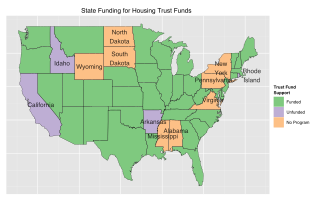Related Research Articles

The United States Department of Housing and Urban Development (HUD) is a Cabinet department in the executive branch of the United States federal government. Although its beginnings were in the House and Home Financing Agency, it was founded as a Cabinet department in 1965, as part of the "Great Society" program of President Lyndon Johnson, to develop and execute policies on housing and metropolises.
The Community Development Block Grant (CDBG), one of the longest-running programs of the U.S. Department of Housing and Urban Development, funds local community development activities with the stated goal of providing affordable housing, anti-poverty programs, and infrastructure development. CDBG, like other block grant programs, differ from categorical grants, made for specific purposes, in that they are subject to less federal oversight and are largely used at the discretion of the state and local governments and their subgrantees.
The Fair Deal was an ambitious set of proposals put forward by U.S. President Harry S. Truman to Congress in his January 1949 State of the Union address. More generally the term characterizes the entire domestic agenda of the Truman administration, from 1945 to 1953. It offered new proposals to continue New Deal liberalism, but with the Conservative Coalition controlling Congress, only a few of its major initiatives became law and then only if they had considerable GOP support. As Richard Neustadt concludes, the most important proposals were aid to education, universal health insurance, the Fair Employment Practices Commission, and repeal of the Taft–Hartley Act. They were all debated at length, then voted down. Nevertheless, enough smaller and less controversial items passed that liberals could claim some success.
The term New Frontier was used by Democratic presidential candidate John F. Kennedy in his acceptance speech in the 1960 United States presidential election to the Democratic National Convention at the Los Angeles Memorial Coliseum as the Democratic slogan to inspire America to support him. The phrase developed into a label for his administration's domestic and foreign programs.
We stand today on the edge of a New Frontier—the frontier of the 1960s, the frontier of unknown opportunities and perils, the frontier of unfilled hopes and unfilled threats. ... Beyond that frontier are uncharted areas of science and space, unsolved problems of peace and war, unconquered problems of ignorance and prejudice, unanswered questions of poverty and surplus.

Canada Mortgage and Housing Corporation (CMHC) is a Crown Corporation of the Government of Canada. Its superseding agency was established after World War II, to help returning war veterans find housing. It has since expanded its mandate to assist housing for all Canadians. The organization's primary goals are to provide mortgage liquidity, assist in affordable housing development, and provide unbiased research and advice to the Canadian government, and housing industry.
The Rural Housing Service (RHS) is an agency of the United States Department of Agriculture (USDA). Located within the Department's Rural Development mission area. RHS operates a broad range of programs to provide moderate- low- and very-low-income Americans in rural communities with:

The Bureau of the Public Debt was an agency within the Fiscal Service of the United States Department of the Treasury. United States Secretary of the Treasury Timothy Geithner directed the Bureau be combined with the Financial Management Service into the single Bureau of the Fiscal Service in 2012.
The Commodity Credit Corporation (CCC) is a wholly owned United States government corporation that was created in 1933 to "stabilize, support, and protect farm income and prices". The CCC is authorized to buy, sell, lend, make payments, and engage in other activities for the purpose of increasing production, stabilizing prices, assuring adequate supplies, and facilitating the efficient marketing of agricultural commodities.

It's Time was a successful political campaign run by the Australian Labor Party (ALP) under Gough Whitlam at the 1972 election in Australia. Campaigning on the perceived need for change after 23 years of conservative government, Labor put forward a raft of major policy proposals, accompanied by a television advertising campaign of prominent celebrities singing a jingle entitled "It's Time". It was ultimately successful, as Labor picked up eight seats and won a majority. This was the first time Labor had been in government since it lost the 1949 election to the Liberal Party.
In the United States, federal assistance, also known as federal aid, federal benefits, or federal funds, is defined as any federal program, project, service, or activity provided by the federal government that directly assists domestic governments, organizations, or individuals in the areas of education, health, public safety, public welfare, and public works, among others.

The Food, Conservation, and Energy Act of 2008 was a $288 billion, five-year agricultural policy bill that was passed into law by the United States Congress on May 22, 2008. The bill was a continuation of the 2002 Farm Bill. It continues the United States' long history of agricultural subsidies as well as pursuing areas such as energy, conservation, nutrition, and rural development. Some specific initiatives in the bill include increases in Food Stamp benefits, increased support for the production of cellulosic ethanol, and money for the research of pests, diseases and other agricultural problems.
The Clean Water State Revolving Fund (CWSRF) is a self-perpetuating loan assistance authority for water quality improvement projects in the United States. The fund is administered by the Environmental Protection Agency and state agencies. The CWSRF, which replaced the Clean Water Act Construction Grants program, provides loans for the construction of municipal wastewater facilities and implementation of nonpoint source pollution control and estuary protection projects. Congress established the fund in the Water Quality Act of 1987. Since inception, cumulative assistance has surpassed US$126 Billion, and is continuing to grow through interest earnings, principal repayments, and leveraging.

The American Recovery and Reinvestment Act of 2009 (ARRA), nicknamed the Recovery Act, was a stimulus package enacted by the 111th U.S. Congress and signed into law by President Barack Obama in February 2009. Developed in response to the Great Recession, the primary objective of this federal statute was to save existing jobs and create new ones as soon as possible. Other objectives were to provide temporary relief programs for those most affected by the recession and invest in infrastructure, education, health, and renewable energy.
Section 523 loans are a mutual self-help rural housing program in the United States authorized under Section 523 of the Housing Act of 1949 and administered by the Rural Housing Service (RHS). Nonprofit organizations may obtain 2-year loans to purchase and develop land that is to be subdivided into building sites for housing. The interest rate is 3% for these loans. Applicants must demonstrate a need for the proposed building sites in the locality. Sponsors also may obtain technical assistance (TA) grants to pay for all or part of the cost of developing, administering, and coordinating programs of technical and supervisory assistance to the families who are building their own homes. Each family is expected to contribute at least 700 hours of labor in building homes for each other. Applicants must demonstrate that:
Section 514 loans are a domestic, farm labor housing program in the United States, authorized under Section 514 of the Housing Act of 1949. They are the only nationwide program to provide housing for farm laborers. The Rural Housing Service (RHS) makes loans to farm owners, associations of farm owners, Indian tribes, or nonprofit organizations to provide modest living quarters, basic household furnishings, and related facilities. Loans may also be used to repair existing housing for farm labor use. The loans are repayable in 33 years and bear an interest rate of 1%.

Housing trust funds are established sources of funding for affordable housing construction and other related purposes created by governments in the United States (U.S.). Housing Trust Funds (HTF) began as a way of funding affordable housing in the late 1970s. Since then, elected government officials from all levels of government in the U.S. have established housing trust funds to support the construction, acquisition, and preservation of affordable housing and related services to meet the housing needs of low-income households. Ideally, HTFs are funded through dedicated revenues like real estate transfer taxes or document recording fees to ensure a steady stream of funding rather than being dependent on regular budget processes. As of 2016, 400 state, local and county trust funds existed across the U.S.

Due to the common occurrence of hurricanes in the coastal state of North Carolina, hurricane recovery in North Carolina is a large component of the state's emergency management efforts. Recovery from these tremendous storms at the local and state level is a large part of the aftermath of a hurricane. Gavin Smith and Victor Flatt stated that "Disaster recovery remains the least understood aspect of hazards management, when assessed relative to preparedness, response, and hazard mitigation." Smith and Flatt also went on to state that the role of the states is even less understood. The review of the plans and policies that instruct recovery, agencies involved, funding processes and budgets, and the environmental effects of a hurricane creates a better understanding of how North Carolina recovers from a hurricane.

A USDA Home Loan from the USDA loan program, also known as the USDA Rural Development Guaranteed Housing Loan Program, is a mortgage loan offered to rural property owners by the United States Department of Agriculture.

Public Law 113-2, containing Division A: Disaster Relief Appropriations Act, 2013 and Division B: Sandy Recovery Improvement Act of 2013 is a U.S. appropriations bill authorizing $60 billion for disaster relief agencies. The Budget Control Act of 2011 (BCA), had authorized only disaster spending and emergency spending to exceed established spending caps. While emergency spending is not subject to the caps in the BCA, spending for disaster relief is calculated by taking the average of the previous ten years disaster relief spending, excluding the highest and lowest spending years.
The Watts Labor Community Action Committee (WLCAC) is a non-profit, 501 (c) 3 organization incorporated in the State of California, in 1965. Its mission "is to improve the quality of life for the residents of Watts and neighboring communities."
References
